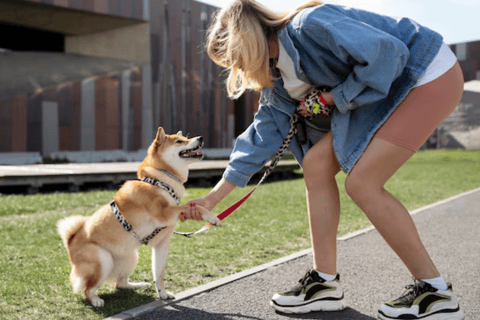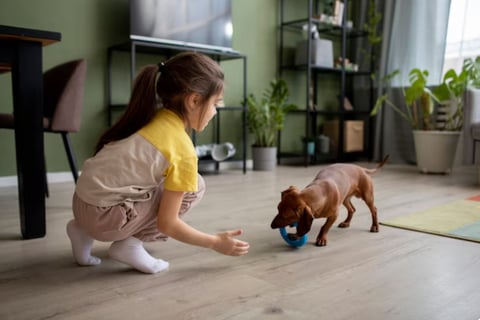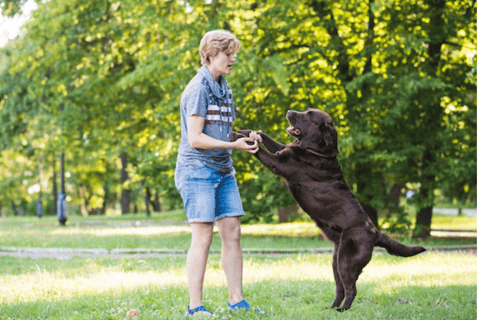
Exploring the Benefits of Mental Exercises for Dogs
Mental stimulation for our furry friends is more than just a way to keep them occupied. It's a crucial part of their overall well-being, affecting everything from their happiness to their health. Let's dive into the fascinating world of mental exercises for dogs and discover the myriad ways they can enhance our pets' lives.
FAMILY
Grace Isabella
4/27/20244 min read
I. Introduction
When we think of exercising our dogs, it's usually their physical needs that come to mind. However, just like humans, dogs need to keep their minds sharp and engaged. Mental exercises, or brain games, play a significant role in ensuring a dog's cognitive health and overall happiness.
1. Understanding Mental Exercises
Mental exercises for dogs can range from simple games like hide and seek to more structured activities like puzzle toys and obedience training. These activities stimulate a dog's brain, encouraging them to think, learn, and solve problems.
2. The Importance of Mental Health in Dogs
A dog's mental well-being directly influences its physical health and behavior. Dogs that receive regular mental stimulation are not only smarter but also less prone to anxiety and behavioral problems.
3. Setting the Stage
Our goal is to explore the various types of mental exercises available for dogs and how they can significantly improve our pets' quality of life, ensuring a well-rounded approach to canine health that focuses on both physical and mental well-being.
Discover the Brain-Boosting Tricks for Your Dog! Access Now!
II. The Science Behind Mental Exercises for Dogs
1. Understanding Canine Cognition
Dogs are intelligent beings with the ability to learn, solve problems, and even manipulate their environment to get what they want. Stimulating their mind through various exercises can enhance these capabilities.
2. Neurological Benefits
Engaging a dog in mental exercises stimulates their brain, creating new neural pathways, and reinforcing existing ones. This process, known as neuroplasticity, improves their cognitive functions and can even slow down the aging process of the brain.
3. Long-term Mental Health Impacts
Regular mental stimulation is linked to decreased rates of cognitive decline in aging dogs. By keeping their minds active, we can help our pets maintain their mental sharpness well into their senior years.
III. Types of Mental Exercises for Dogs
1. Puzzle Toys and Games
· Kong toys, filled with treats, challenge dogs to figure out how to get to the food.
· Interactive puzzles require them to move pieces around to find hidden rewards.
2. Training Sessions as Mental Workouts
Learning new commands or tricks is not just about obedience; it's a form of mental workout that challenges dogs and keeps them engaged.
3. DIY Brain Games
· Hide and seek, using treats or even yourself as the hidden object, is a great way to stimulate your dog's mind.
· Home-made obstacle courses can be set up with everyday items, providing physical and mental exercise.
Discover the Brain-Boosting Tricks for Your Dog! Access Now!
IV. Practical Tips for Implementing Mental Exercises
1. Establishing a Routine
Consistency is key. Set aside time each day for mental exercises, making them a regular part of your dog's routine.
2. Adapting to Your Dog's Needs
Every dog is unique. Choose activities that suit your dog's age, breed, and temperament. For instance, scent games are great for hounds, while herding breeds might enjoy puzzle toys more.
3. Monitoring Progress and Engagement
Keep an eye on how your dog responds to different activities. Look for signs of enjoyment, like wagging tails and excited behavior, but also watch for signs of frustration or disinterest, which mean it might be time to try something new.
Discover the Brain-Boosting Tricks for Your Dog! Access Now!
V. Mental Exercises and Behavioral Benefits
1. Reducing Problem Behaviors
Boredom and excess energy are often the root causes of destructive behaviors. Mental exercises can help mitigate these issues by keeping your dog's mind actively engaged.
2. Enhancing Training Outcomes
Dogs that regularly engage in mental exercises tend to learn faster and retain new commands better, thanks to improved cognitive functions.
3. Promoting Emotional Stability
Mental stimulation can help prevent anxiety and depression in dogs by keeping them mentally balanced and content.
Unlock The Secret to Smarter Dogs Today! Click Here!
VI. Beyond the Basics: Advanced Cognitive Challenges
1. Sport and Agility Training
These activities not only offer physical exercise but also require mental focus and problem-solving, providing a comprehensive workout for your dog.
2. Interactive Play and Socialization
Playing with other dogs or humans encourages your dog to think and react, promoting social skills and cognitive development.
3. Tech-Assisted Mental Exercises
Modern technology offers new ways to engage your dog's brain, from interactive digital toys to apps designed for canine cognitive stimulation.
Unlock The Secret to Smarter Dogs Today! Click Here!
Conclusion
Mental exercises play a crucial role in a dog's overall well-being, offering myriad benefits that extend beyond mere entertainment. By incorporating these activities into our pets' daily routines, we can enhance their cognitive abilities, behavior, and emotional health, ensuring a happier, healthier life for our furry companions.
Final Thoughts
Let's embrace a holistic approach to our dogs' health, recognizing that a stimulated mind is just as important as a exercised body. Together, we can unlock a more fulfilling and joyful life for our best friends.
Frequently Asked Questions (FAQs)
Q: How often should I engage my dog in mental exercises?
A: Aim for daily sessions, adjusting the length and complexity based on your dog's age, health, and interest level.
Q: Can elderly dogs benefit from mental exercises?
A: Absolutely! Mental exercises can help keep older dogs' minds sharp, combatting cognitive decline.
Q: What are the signs of mental fatigue in dogs?
A: Signs include disinterest in playing, walking away from challenges, or showing signs of stress like yawning and licking lips.
Q: Are there any risks associated with mental exercises for dogs?
A: When appropriately chosen and monitored, the risks are minimal. However, avoid overly challenging or frustrating activities.
Q: How can I tell if my dog enjoys the mental exercises or finds them stressful?
A: Watch for positive engagement signs, such as eagerness to participate and excitement during the activity. Signs of stress may indicate the need to adjust the difficulty or change the activity.
How to Train Your Dog Like a Pro in Just Days! Click to Discover!
Connect
info@graciebusiness.com








